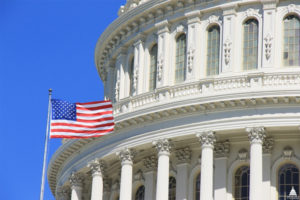U.S. Senate Hearing Exposes Partisan Differences Over New Russia Sanctions

(Article text ©2019 RFE/RL, Inc., Radio Free Europe/Radio Liberty – rferl.org – Todd Prince – WASHINGTON, Dec. 4, 2019 – article text also appeared at rferl.org/a/u-s-senate-hearing-exposes-partisan-differences-over-new-russia-sanctions/30306449.html)
A hearing in the Senate to discuss U.S. foreign policy towards Russia exposed partisan disagreements over whether to impose new sanctions on a rival power accused of “malign” actions, including interference in foreign elections.
Senate Foreign Relations Committee Chairman James Risch, a Republican from Idaho, kicked off the two-hour-long hearing on December 3 that featured testimony from two State Department officials by saying that sanctions do not comprise a strategy for dealing with the Kremlin.
“While U.S. financial preeminence makes sanctions an easy and somewhat effective tool, I have serious concerns about the consequences of their overuse, particularly in the absence of a larger strategy. More sanctions don’t make us tougher on Russia,” he said.
Washington has imposed sanctions on 321 Russia-related entities and individuals, including politicians and businessmen close to President Vladimir Putin, since 2017 for a series of actions including interference in the U.S. elections.
Risch’s opening statement seemed to be a reply to Senate Minority Leader Chuck Schumer, a Democrat from New York, who said on December 2 that it was “incomprehensible” that Republicans would not support new sanctions to deter future Russian election interference.
Democrats want to include measures into the National Defense Authorization Act that would impose sanctions on Russia’s banking and energy sectors as well as its sovereign debt.
“More general sanctions actions, when not connected to specific goals, can be counterproductive. And sanctions not done in coordination with our European allies, who are far closer to Russia in both distance and connectivity, is a dangerous action that can undermine our alliances,” Risch said.
Senator Bob Menendez, the ranking Democrat member on the Senate Foreign Relations Committee, admitted that sanctions against Russia could have “spillover effects” on U.S. businesses and investors active in the country as well as the global banking and energy industries.
Sanctions imposed against Rusal, Russia’s largest aluminum producer, in 2018 affected metals markets.
However, Menendez said that should not stop Washington from moving ahead with new measures.
“We should, of course, seek to minimize these [spillover] effects, but our ultimate measure must always be how continued Kremlin aggression impacts our national security. At the end of the day, that is the ultimate measure that matters,” Menendez said.
U.S. sanctions on Russia in place since 2014 have contributed to slowing the country’s economic growth.
Senator Rand Paul, a Republican from Kentucky, said that sanctions have not changed Russia’s behavior to date and that Washington should “reconsider” how it structures them. He said that U.S. sanctions are “too large and too unreasonable.”
National pride will prevent some countries from buckling under U.S. sanctions, he said. Russia is unlikely to ever leave Crimea — which it annexed from Ukraine in 2014 — because of U.S. sanctions, Rand said.
“Countries have their own sort of national pride and once they get their backs up, they are like ‘well, we are not changing. You know we are never going to do that,'” he added.
The United States needs to make clear what actions a country can take that would lead to the removal of sanctions, Rand said.
“You put your thumb on a very important point which is the need for reversibility and flexibility — the threat can be more effective than the actual imposition of a sanction,” Under Secretary David Hale said in response to Rand’s questioning.
The hearing did demonstrate bipartisan support for sanctions against Nord Stream 2, Russia’s $11 billion gas pipeline to Germany.
Senators from both parties oppose the project amid concern it will make Europe more reliant on Russian energy. Congress has sought to sanction the companies building the pipeline in order to halt its completion, which is scheduled for early next year.
The Trump administration has the power to sanction the project under the 2017 Countering America’s Adversaries Through Sanctions Act (CAATSA), Menendez and Senator Ted Cruz, a Republican from Texas, told Hale.
“If the pipeline is completed, it will be the fault of the members of this administration who sat on their rear ends and didn’t exercise their clear power. You have an overwhelming bipartisan mandate from Congress to stop this pipeline,” said Cruz.
Nord Stream 2 sanctions could help boost U.S. exports of liquefied natural gas to Europe.
